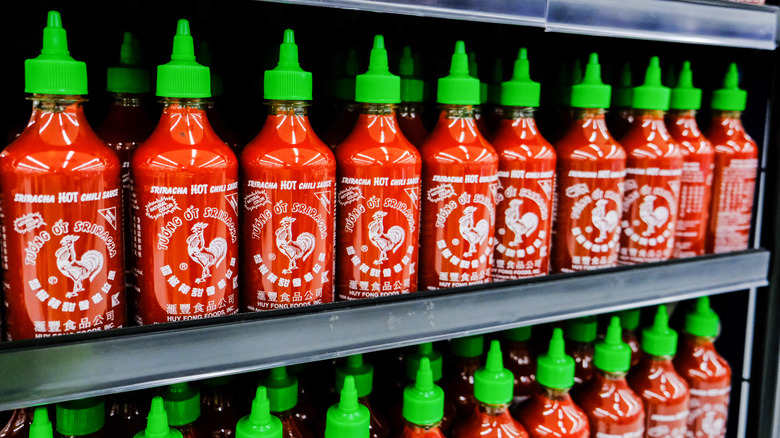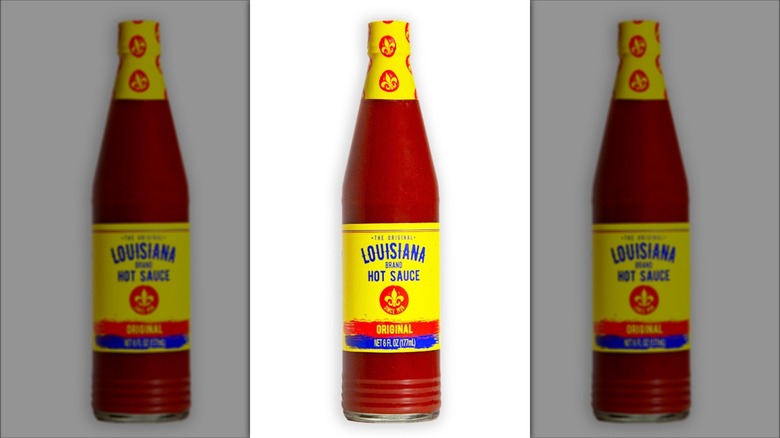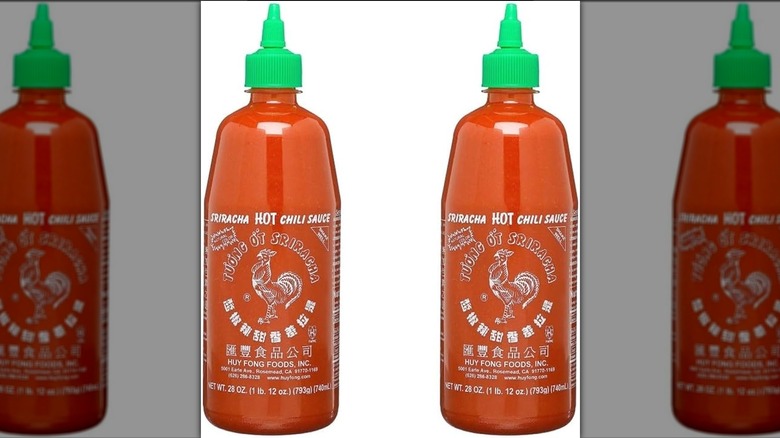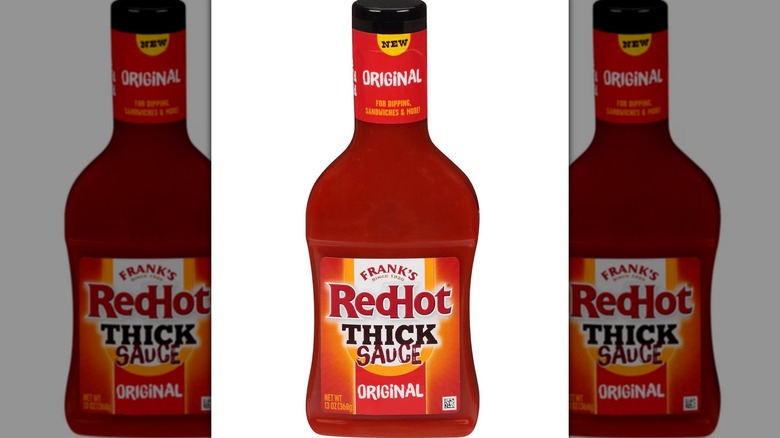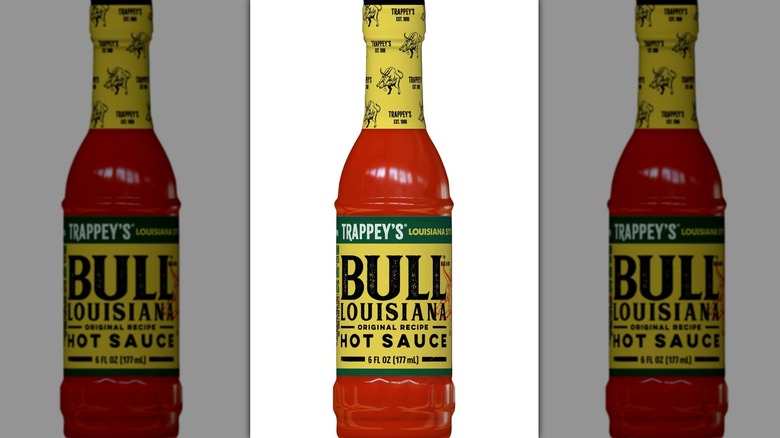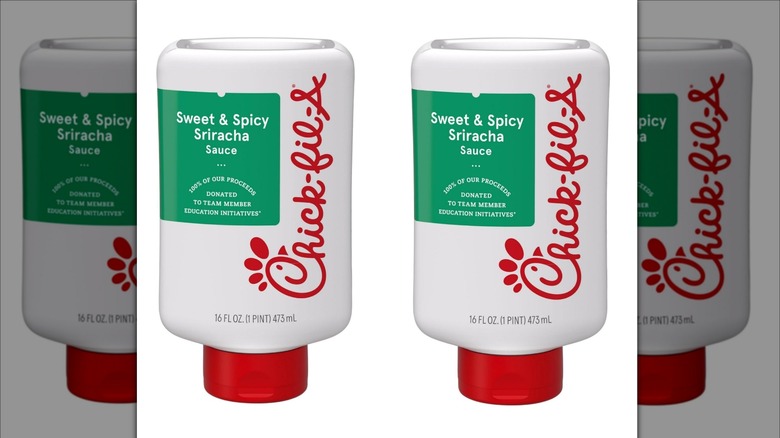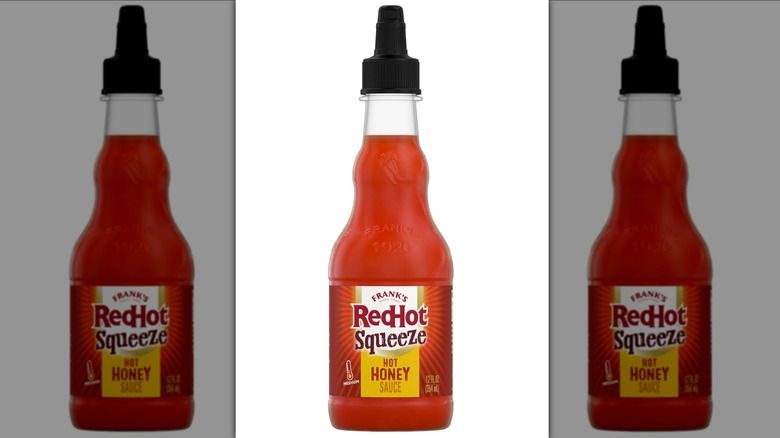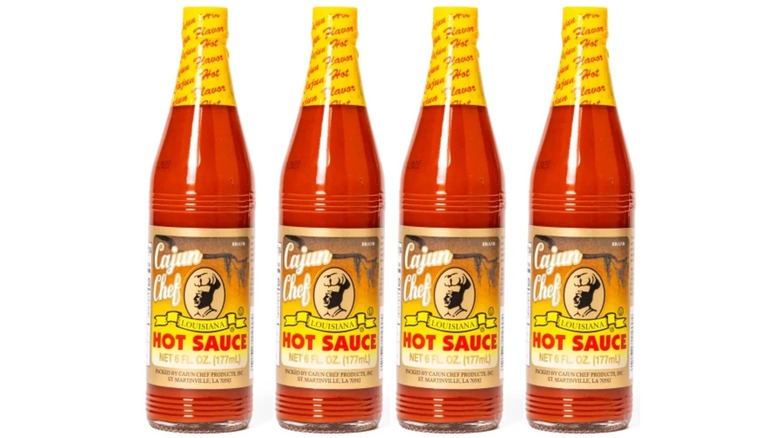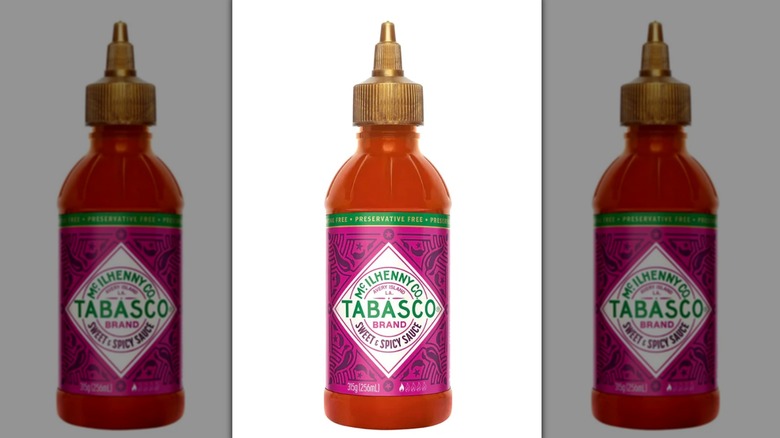8 Of The Unhealthiest Hot Sauces You Can Buy
We may receive a commission on purchases made from links.
How often do you look at the nutrition label of hot sauce? Chances are, not frequently. Hot sauce is the type of thing you reach for without thinking twice. But even if you only have a little bit here and there, condiment usage adds up. It might be the reason extra calories, sugar, or sodium are sneaking into your diet. So if you're wondering which hot sauces you should avoid, we've got you covered. We've examined the nutritional content of many popular brands to uncover the eight unhealthiest hot sauces you can buy.
Before we begin, spicy food fans may need clarification on which hot sauces we're focusing on and what we mean by "unhealthy." First off, we're looking at classic hot sauce brands that use vinegar and spicy peppers as a base; the type you're more likely to drizzle over a meal rather than use as a marinade or dipping sauce. Think sriracha, Louisiana sauces, and your classic red pepper sauce. Iconic brands like Tabasco and Frank's fit this criteria.
For the sake of this article, we defined unhealthy hot sauces as those containing artificial chemicals or excess sugar or sodium. We also reviewed scientific studies to understand what makes these ingredients so harmful. So if you want to feel the fire without unhealthy side effects, read on. We'll tell you exactly which hot sauces to avoid and why.
1. Original Louisiana Brand Hot Sauce
Louisiana Brand Hot Sauce comes with a mild heat and bold Cajun flavor. Much like the first hot sauces created, this brand has a short list of ingredients. It contains solely aged peppers, distilled vinegar, and salt. However, when we say salt, we mean lots of it. In fact, Original Louisiana Brand has one of the highest sodium levels on this list. A mere teaspoon serving is packed with 200 mg.
We're not here to villainize sodium. It's an essential nutrient and we couldn't survive without it. However, too much of a good thing can be bad, especially in this case. According to the Journal of the American College of Cardiology, excess sodium is linked to increased blood pressure, fluid retention, and impaired kidney function. So if you're feeling a sudden bloat after eating, check the back of that food label to see just how much sodium you consumed. And if you already have high blood pressure or impaired kidneys, you may want to be wary of super salty foods.
So how much sodium is too much? This is a hotly debated topic in the health universe, but currently, the Federal Drug Administration recommends that adults limit their intake to 2,300 mg a day. If you've done the math, that's 11 teaspoons of Original Louisiana Brand Hot Sauce. Mind you, that's a lot of hot sauce! However, if you're trying to go easy on sodium, we'd keep that condiment consumption in check.
2. Huy Fong Sriracha
Even if you don't know it by name, you'd recognize Huy Fong's Sriracha on store shelves. The iconic rooster logo and green-capped bottle are unmistakable. And thanks to its balance of heat, sweetness, and garlic, Huy Fong is one of the top hot sauce brands on the market. Unfortunately, just because it's popular doesn't mean it's healthy, especially since this sriracha contains potassium sorbate.
Although potassium sorbate is a common food preservative, a Trends in Food Sciences and Technology article found that it can have a negative impact on your health. The article describes that, although your body breaks down the potassium sorbate from food into harmless substances (like carbon dioxide and water), it can also be absorbed directly into your bloodstream. This can damage DNA and contribute to various diseases.
Why is damaging your DNA so bad? Because our bodies are filled with cells that carry out essential functions, from sleeping to fighting off disease. When these cells are damaged, they don't function optimally. As Science Direct notes, this DNA damage can contribute to aging and neurodegenerative diseases. Of course, a little sriracha probably won't kill you, but it's not the only food item with harmful preservatives. So take note of how many of the processed foods you eat contain potassium sorbate. Chances are, this sneaky additive is creeping into your diet more often than you realize.
3. Frank's RedHot Original Thick Sauce
Sometimes, regular hot sauce just doesn't cut it. You crave something thicker so that when you pour it all over your burger or nachos, it adds a more satisfying mouthfeel. This is exactly what you get with Frank's RedHot Original Thick Sauce. But unfortunately, that's not all you're getting. Along with that tangy, spicy flavor and thicker consistency comes a questionable preservative.
To extend the shelf-life of its products, the brand uses sodium benzoate. This preservative is widely used and generally considered safe, but when we dig into the research, many studies say otherwise. One study published in Physiology International reported that sodium benzoate activated the inflammatory pathways in mice. Inflammation is a normal response if you're fighting off injury or infection, but not when consuming condiments. According to the National Institute of Health, prolonged inflammation can lead to a variety of health problems, including digestive issues and a higher risk of chronic diseases, not to mention an increase in daily aches and pains which is bound to lower your quality of life.
In another study published in the British Journal of Nutrition, sodium benzoate decreased leptin in mice. Leptin is known as the satiety hormone. It gives us that full feeling after eating, so we know when to stop. Without it, people are much more likely to overeat, leading to excess calories and obesity.
4. Trappey's Bull Louisiana Hot Sauce
Trappey's Bull Louisiana Hot Sauce has that fiery red hue we associate with spicy peppers. When we see such a vibrant color, our taste buds immediately prepare themselves for heat and spice, which is an exciting sensory response if you're a hot sauce fan. Unfortunately, this beautiful red isn't solely from peppers, but also Red 40, an artificial dye with some nasty side effects.
It's been rumored that an increase in food dyes is linked to a higher incidence of certain cancers. In a study published in Toxicology Reports, researchers tested this theory on mice, giving them doses of the synthetic dye Red 40. Their results showed an increase in dysbiosis and gastrointestinal inflammation, which are both key players in colorectal cancer. Another study in Neurotherapeutics showed a link between Red 40 and attention deficit hyperactivity symptoms in children.
With all this evidence, it's not surprising that some countries have tight restrictions on artificial dyes. In Europe, food containing Red 40 must come with warning labels so consumers are aware of the potential harm. However, the United States is more lax in this department. So if you're reaching for a bottle of bright red hot sauce, make sure to read the ingredient list carefully.
5. Chick-fil-a Sweet and Spicy Sriracha Sauce
Chick-fil-A Sweet and Spicy Sriracha Sauce pairs perfectly with fried chicken sandwiches, nuggets, wings, and the like. It's no wonder a chicken establishment created it. The unique blend of sweet and spicy enhances most of the restaurant's dishes. However, the company may have gotten carried away with the "sweet" portion of this product.
Sugar is the first ingredient listed, which isn't surprising seeing how a 2-tablespoon serving has 60 calories and 13 g of sugar. Mind you, 2 tablespoons is a hefty serving size, but seeing how sweet this sauce is, it's easier to consume than more acidic condiments. Unfortunately, a Frontiers in Immunology review found that excess sugar intake can lead to obesity, cardiovascular issues, and type 2 diabetes.
In addition to sugar, this hot sauce also has a preservative called calcium disodium EDTA. Although it's considered safe in small amounts, overconsumption can cause uncomfortable side effects. More specifically, a Scientific Reports study showed that it causes gastrointestinal inflammation which in turn exacerbates colon cancer in mice. When taken as a prescription medication, RxList also warns that it can cause stomach cramps, nausea, headache, low blood pressure, and skin issues.
6. Frank's RedHot Squeeze Hot Honey Sauce
Frank's RedHot Squeeze Hot Honey Sauce is one of many hot honey sauces hitting store shelves. People are adding this hot condiment to everything from gourmet popcorn to homemade margaritas. But while hot honey contributes a sweet and spicy touch, it also adds a substantial amount of sugar. This product is sweetened with both honey and regular sugar for a total of 6 grams of sugar in a 1-tablespoon serving.
Sugar aside, this sauce also contains xanthan, an emulsifier used to thicken the sauce. This bodes well in the texture department and is generally considered safe for most people. However, it isn't recommended for those with digestive issues. Medical News Today reports that xanthan gum can increase intestinal inflammation and worsen symptoms of Crohn's disease and IBS. The news outlet also discourages anyone allergic to cruciferous vegetables from consuming xanthan gum since it's derived from bacteria on these plants.
Additionally, studies don't look promising for gums in general. In an Alternative Therapies in Health and Medicine study, researchers tested the immune response of blood samples after exposure to seven different gums. Over a tenth of the specimens tested produced antibodies against all of them. It's hard to know if you'd fall into this category, especially if you don't produce a strong, immediate allergic reaction, but it's worthwhile to keep in mind that your body might have a negative reaction to ingesting gum even if you don't detect any discomfort. If you're looking for a healthier option, we recommend making homemade hot honey using only the best ingredients.
7. Cajun Chef Hot Sauce
Cajun Chef hot sauces might have the perfect amount of spice, but they also come with some potential health risks. The brand's classic Hot Sauce and Louisiana Hot Sauce contain Yellow 6 and Red 40. Sadly, both these food dyes have been linked to scary side effects.
According to National Health Service research, Red 40 and Yellow 6 have been linked to hyperactivity in kids, so it's a double whammy in this department. Some might think it's easy to brush off the results of this study. Although it's unsafe for children, it's probably okay for adults, right? Unfortunately, the effects of food dyes aren't that black or white.
Adults are larger and more developed, so it's only logical to assume they aren't impacted as much as children, but that doesn't mean they're getting off scot-free. Ultimately, we need more research to understand the full effects of artificial food colorings on adults. In the meantime, we'd play it safe. So if you want to avoid pesky food dyes, read the label before you reach the checkout stand or try making a homemade hot sauce instead.
8. Tabasco Sweet and Spicy Sauce
Tabasco is one of the most popular hot sauce brands on the market. You probably have a bottle or two in your cupboard right now. But while the standard Tabasco pepper sauce is fine, the company's Sweet and Spicy Sauce is a different story.
Tabasco Sweet and Spicy Sauce has 3 grams of sugar per 1 teaspoon serving. We realize this doesn't sound like a massive amount. However, the small serving size can be deceptive, especially since this hot sauce has the highest sugar content on our list. Plus, those teaspoon-sized servings — along with sugar intake — are bound to add up, especially if you're the type who pours hot sauces on absolutely everything. Unfortunately, excess sugar intake has been linked to diabetes per the European Journal of Nutrition.
The results of the study make sense. Your body tries to maintain a healthy level of blood glucose at all times. So every time you consume something sugary — including condiments — your pancreas releases insulin. This hormone converts blood sugar into energy, bringing blood glucose back down to a normal range. However, when you consume too much sugar too often, your pancreas starts working on overdrive. Eventually, it might not be able to keep up. To avoid this, go easy on the sugar, including those sweet and spicy sauces.
